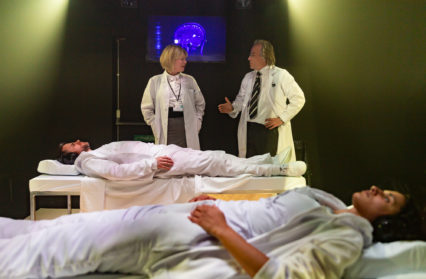Jemma Beggs attended a performance of The Effect from The Other Room, which takes a look at modern love and relationships as well as depression and mental illness.
Forming the final part of The Other Room’s triptych season, LOVESICK, The Effect continues the theme of challenging us “to confront our modern ideas of ‘love’ [and explore] what our relationships really mean”. The premise is a sound one and Lucy Prebble’s script provides a wealth of intriguing concepts and theories on depression and the best form of treatment for it, the corrosive effect of mental illness on a person’s sense of self and the validity of love when drug-induced. However, these ideas are unfinished, cast out into the ether for the audience to seize upon and draw their own conclusions from; presumably at a later date, as the compact theatre space and unrelenting emotional deluge taking place on stage makes it an impossible task to undertake any real depth of thought during the production.
There is an important distinction to make in that whilst the play is emotional, it is rarely emotive. The acting is by no means poor, but the issue is that there is no mistaking that it is acting, and that constant awareness makes it impossible to breach the distance between the audience and the characters, to become fully invested in their stories. There is far too much overemphasis and over-enunciation; each word spat out with spiky edges, creating a stylised production at odds with the intimate setting. This works to an extent for Nicola Reynolds in the role of cold, clinical Dr James, but does not lend itself as well to the rest of the cast.
Whilst this overt, on-the-nose style of acting recedes in the second Act, it is too late to establish any real depth of emotional connection or belief in the authenticity of the characters. Having witnessed half the cast in previous productions, it is not their acting ability that is in question, but rather the direction they have received from Dan Jones. Neal McWilliams comes closest to convincing the audience of his character as increasingly agitated patient Tristan, with a consistently strong and believable performance, although Nicola Reynolds also achieves a poignancy as she completely unravels from efficient doctor to extremely distressed woman.
Another hindrance to the emotional investment in this production is the overabundance of artificial anger; there is an excessive use of heightened emotion, raised voices and disproportionate outbursts in non-crucial moments, each once only serving to lower the impact when something shocking or deserving of a substantial reaction occurs. Again, it would appear Director Dan Jones, has failed to harness the skills of the actors in order to deliver fewer, but far more poignant moments of intensity.
The script is also partially to blame in the production’s failure to fully enthral; it feels confused at times and indulgent, meandering between theories and at times unrealistic within its own confines. When the male patient taking part in the drugs trial hits the female patient full force in the face, the reaction is muted compared to previous dramatised responses to far less shocking actions. The scene abruptly ends, with no further mention made to what is arguably the most disturbing and violent part of the play. This is frustrating and unsettling – what then is the audience to deduce from this seemingly pivotal moment which fails to resonate further than its immediate present?
The play’s greatest strength is in its strong visual impression; the atmospheric feel created by the hazy room, the screens utilised to count down the seconds till the experiment begins or display the patients’ vitals, the panelled lights transformed to imitate a hospital scanner and the pills swallowed periodically by the cast members. The whole concept of the set is extremely good and the level of detail included makes for a realistic and exciting environment, although a split audience layout does pose some logistical issues. Although most of the action is delivered to maximise viewing from all angles, there are occasions where one half of the audience is missing important nuances, facial expressions and even dramatic parts of the action, simply because they cannot see the actors’ faces.
The Other Room always gives the impression of wanting to raise awareness of issues and create conversation and debate with their plays, as well as to entertain, and with so many fascinating ideas in The Effect, there is no doubt they have succeeded in creating a thought-provoking piece of art. On this occasion unfortunately, whether due to a prickly script or direction that slightly misses the mark, the concepts simply prove more compelling than the production itself.
(Image credit: Kieran Cudlip)
You might also like…
Jafar Iqbal reviews the latest production from Cardiff’s award-winning pub theatre, The Other Room, All But Gone.
Jemma Beggs is a regular contributor to Wales Arts Review.












